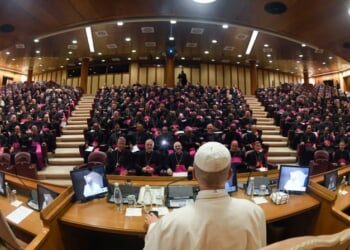Dr Neil Shastri-Hurst is MP for Solihull West and Shirley.
Integration is not a lifestyle preference or a political convenience. It is a national necessity – and in an age of growing cultural fragmentation, we must stop being shy about saying so.
Britain is a remarkably open and diverse country. We welcome people from every continent, of every faith, and with every kind of life story. That openness is a strength.
But only if it is accompanied by cohesion. Diversity without integration is not a virtue; it is a vulnerability. It leaves communities talking past each other, institutions stretched to breaking point, and national identity diluted into abstraction.
But here is the truth: integration cannot succeed unless we bring migration down to sustainable levels. Mass immigration, year after year, on the scale we have seen, places impossible strain not only on housing, schools, and public services, but also on the very social fabric that integration relies upon.
You cannot expect newcomers to embed in a society that is itself struggling to absorb, adapt, and connect. If people are arriving faster than communities can integrate them, we do not get a melting pot, but parallel lives. That fragmentation has consequences we can no longer afford to ignore.
My father arrived in this country decades ago with few possessions but a firm sense of duty. He worked hard, paid his taxes, and embraced the norms of the society he had joined. He did not ask Britain to bend to his preferences; he adapted to its expectations. That instinct to integrate, to participate, to belong, made his success possible. But more importantly, it made Britain stronger.
We have seen that same instinct in the BN(O) community who have made their home in the United Kingdom. In recent years, Hongkongers arriving under the British National (Overseas) visa scheme have not only sought safety and opportunity but have embraced the values and responsibilities of life in Britain. In Solihull, they have established small businesses, volunteered in local charities, and joined community associations.
Nationally, they have taken an active role in civic society, from supporting local schools to enriching our cultural and professional life, all while respecting and upholding the shared norms of their adopted home. Their story is a reminder that, when migration is at a scale communities can absorb, integration is not only possible but mutually enriching. That instinct must not be lost.
However, for too long, we have allowed the principle of integration to be quietly sidelined. We have confused tolerance with cultural indifference, and become so wary of causing offence that we have stopped saying what ought to be obvious: if you choose to live in Britain, you are choosing to live within a national community, not beside it. That means accepting its values, participating in its institutions, and contributing to its future.
Integration is not the abandonment of identity. It is the embrace of shared allegiance. It does not ask people to forget where they came from, but it does ask them to recognise where they are now; and the responsibilities that come with that choice.
Britain is not a blank canvas or a lifestyle supermarket. It is a nation: a story, a culture, a set of civic habits, and a long-standing constitutional tradition. It is held together not simply by law, but by shared norms, quiet loyalties, and common expectations.
Some on the left bristle at the idea of national identity. Some on the libertarian right dismiss it as unimportant in the face of markets and individual choice. However, this is where conservative thought stands apart. Conservatism recognises that liberty must be rooted in tradition. That belonging matters. That the good society is not merely free, but bound by mutual obligation. Integration is what gives that obligation meaning.
Too often, we have mistaken multiculturalism for relativism. We have fallen into the trap of thinking that to accommodate difference, we must abandon standards. That is simply wrong: the strength of a diverse society lies in its ability to bring people together, not to retreat into cultural silos. Yet that is precisely what has happened in parts of modern Britain.
Across too many of our towns and cities, different communities live near each other, but not with each other. Social trust has weakened. Civic participation has declined. The institutions that once provided shared spaces – schools, public services, local associations – are under increasing strain.
Immigration policy has made this worse, not better. We have allowed net migration to spiral beyond all democratic consent; hundreds of thousands each year, placing strain on the very systems that are meant to unite us. This is not sustainable: not economically, not environmentally, and not socially. It is neither unkind nor intolerant to say that a society must be able to breathe; and at present, Britain is gasping.
This is not simply a cultural concern. It is a structural threat to our national resilience. We saw this clearly during the pandemic. Where communities had strong bonds and shared civic norms, they adapted, supported one another, and acted in the common interest. Where those bonds were absent, communication broke down, guidance went unheeded, and suspicion flourished.
Integration is not just about values, but about function. It determines how a nation copes under pressure.
The same is true in our Armed Forces, where I had the privilege of serving. In uniform, it does not matter where you come from – it matters whether you can be relied upon; whether you understand the mission; whether you stand shoulder to shoulder with those around you. The military is, by definition, a fully integrated institution. It thrives not by erasing diversity, but by subordinating it to common purpose.
We need the same clarity in public life. Our schools must teach British values unapologetically. Our civic institutions must offer common spaces where duty and opportunity are shared, and our political discourse must resist the temptation to treat communities as monolithic blocs to be courted or managed. That only entrenches difference. Real integration is not a box-ticking exercise; it is a moral project.
The point too often missed in the national conversation is that integration is not about conformity, but coherence. It is about preserving the essential thread that binds a nation together. Without it, democracy weakens. The rule of law erodes. The language of shared sacrifice and shared reward becomes impossible.
However, we cannot deliver that coherence unless we are willing to reduce net migration. We cannot keep adding to the population at this pace and expect social cohesion to flourish. We cannot expect successful integration if the communities doing the integrating are themselves overwhelmed and alienated.
We must stop apologising for setting expectations and start recovering the vocabulary of allegiance and duty. We must rediscover moral confidence in what this country stands for and ensure that those who come here are joining that story, not living apart from it.
This is not a call for monoculture. It is a call for civic clarity. For understanding that our institutions, our liberties, and our freedoms are not accidents – they are the product of centuries of consensus. That consensus is not self-sustaining. It requires protection, participation, and limits.
In my work as a doctor, I saw the power of shared commitment. The NHS brings together people from every background to serve a common purpose. That is only possible because it rests on a common ethic: the dignity of every human being, the responsibility to care, the equality of access. Those are not ‘neutral’ values. They are deeply British values, and we must uphold them.
Integration is not a demand. It is a gift. It is what turns a population into a people, and a country into a home. It is what allows difference to flourish within a common moral framework. And it is what makes citizenship real; not simply a status on a passport, but a living relationship between citizen and nation.
If we fail to integrate, we fragment. If we ignore the scale of immigration, we undermine even the best efforts to bring people together.
But if we get both right, we build a society that is not just diverse, but united. Not just welcoming, but cohesive. Not just open, but resilient.
My family’s journey was shaped by the promise of Britain; a country confident enough to open its arms, but wise enough to set terms. That promise must be renewed. It begins with saying what so many people already know:to integrate well, we must migrate wisely. The alternative is drift. The prize is a stronger, more united country. Let us choose it.





![Gavin Newsom Threatens to 'Punch These Sons of B*thces in the Mouth' [WATCH]](https://www.right2024.com/wp-content/uploads/2025/08/Gavin-Newsom-Threatens-to-Punch-These-Sons-of-Bthces-in-350x250.jpg)
![ICE Arrests Illegal Alien Influencer During Her Livestream in Los Angeles: ‘You Bet We Did’ [WATCH]](https://www.right2024.com/wp-content/uploads/2025/08/ICE-Arrests-Illegal-Alien-Influencer-During-Her-Livestream-in-Los-350x250.jpg)








